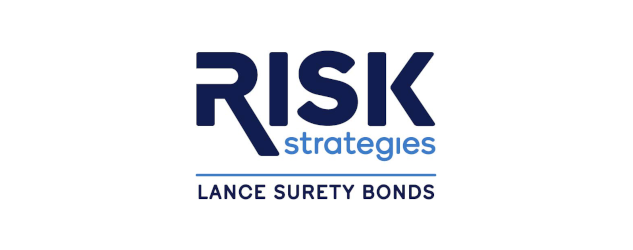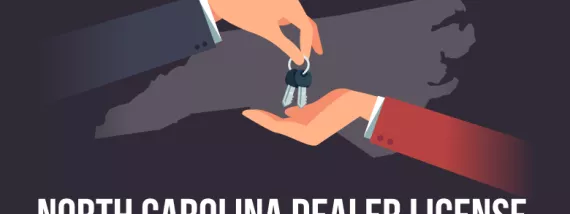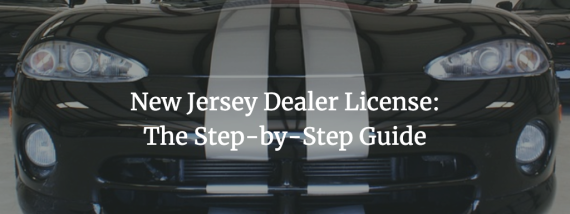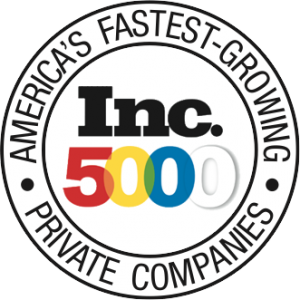How to Get a Dealer License in New York
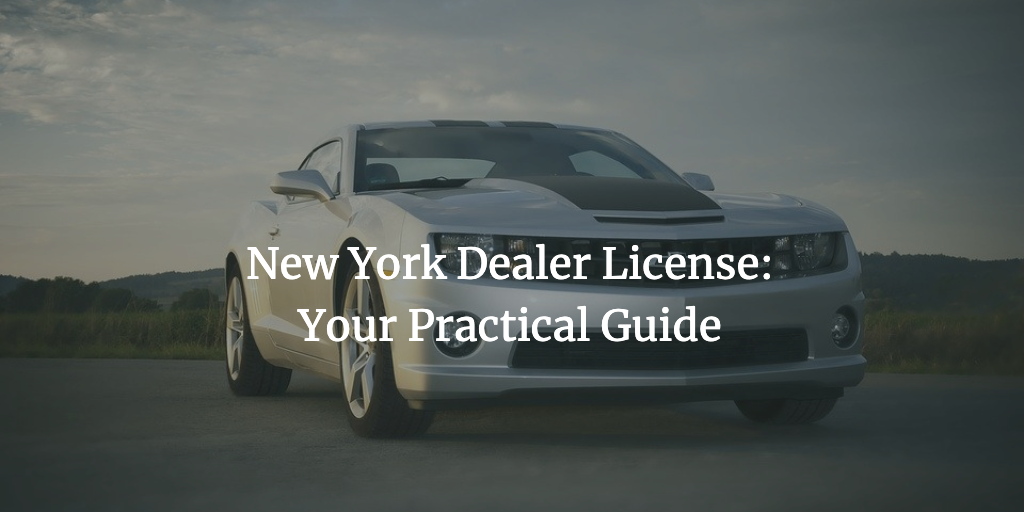
Starting a car dealership in New York requires a New York Dealer License from the Department of Motor Vehicles (DMV). This license allows you to legally buy, sell, or trade vehicles while ensuring compliance with state regulations.
Specifically, a dealer license is required if you:
- Sell or plan to sell more than five vehicles in a calendar year: The New York State Department of Motor Vehicles (DMV) mandates that anyone selling more than five vehicles within a year must be registered as a dealer.
- Engage in the business of buying, selling, or dealing in vehicles: This includes activities such as wholesaling, brokering, or auctioning vehicles.
- Facilitate vehicle sales for a fee or commission: If you act as an intermediary, connecting buyers and sellers and earning a profit from these transactions, a dealer license is necessary.
The process involves several steps, including registering your business, securing a sales tax certificate, obtaining a surety bond, and passing a DMV inspection. While it might seem complex, understanding the process in detail can make the application smoother and prevent delays. This guide breaks down each step, ensuring you have everything you need to successfully apply for your New York Dealer License.
**NEW:** Download our FREE e-book guide containing comprehensive information on how to start your own dealership, from getting licensed and bonded to securing financing and cars for your lot!

There is a list of other criteria that you have to fulfill to get your NY car dealer license, so let’s delve straight into them in the guide below.
1. Find out the Right Dealer License Type
Your first step is to decide what type of dealership you would like to run. Depending on your choice, you will need to obtain the right license from the New York Department of Motor Vehicles (DMV). The main license categories include:
- Retail Motor Vehicle Dealer – New: For businesses selling new vehicles under a franchise agreement with a registered manufacturer.
- Retail Motor Vehicle Dealer – Used/Other: For businesses selling used vehicles, motorcycles, trailers over 1,000 pounds, or limited-use vehicles.
- Wholesale Dealer: For businesses buying, selling, or dealing in vehicles exclusively at wholesale, not to the general public.
- Boat Dealer: For businesses engaged in buying, selling, or trading boats designed for motorized transport.
- Transporter: For entities operating vehicles in a limited capacity for delivery, repair, or improvement purposes.
- ATV Dealer: For businesses dealing in all-terrain vehicles.
- Yacht Broker: For agents facilitating the sale or purchase of boats on behalf of clients.
Note: To get a used car dealer license in New York City, you need both a New York Dealer License from the DMV and a Secondhand Dealer Auto License from the NYC Department of Consumer and Worker Protection (DCWP).
How Many Cars Can You Sell in a Year in NY Without a Dealer License
In New York State, individuals are permitted to sell up to 5 vehicles per year without obtaining a dealer license, provided these vehicles are registered in their name and are for personal use. Selling more than five vehicles annually, or engaging in vehicle sales for profit, requires obtaining a dealer registration from the New York State Department of Motor Vehicles (DMV). This regulation ensures that those regularly buying and selling vehicles adhere to state laws designed to protect consumers and maintain industry standards.
For more details, consult New York State Vehicle and Traffic Law, Section 415.
2. Business Registration
To obtain a New York Dealer License, you must first establish a legal business entity and register your business name properly. The requirements vary depending on your business structure:
Corporation or LLC
Submit the necessary forms to the New York Department of State:
- For an LLC, file the Articles of Organization.
- For a Corporation, file the Certificate of Incorporation.
Publication Requirement (LLC Only): New York law requires newly formed LLCs to publish a notice of formation in two newspapers designated by the county clerk.
Partnership or Individual with Assumed Name (DBA)
If operating under a name other than your own, you must file a Business Certificate of Assumed Name with the County Clerk’s office where the business is located. Although not required by the DMV, having a formal partnership agreement can help clarify roles and responsibilities within the business.
3. Business Location Requirements
To qualify for a New York Dealer License, your business location must meet specific requirements set by the New York State Department of Motor Vehicles (DMV). Here’s a detailed breakdown of what you need:
- Zoning and Legal Compliance
- The location must comply with local zoning laws for operating a vehicle dealership.
- Obtain a Certificate of Occupancy or equivalent documentation from your local municipality.
- Office Space
- A dedicated, enclosed office with adequate space for conducting business.
- The office must include a desk, chair, and secure storage for sales records and business documents.
- It should have heating, lighting, and electricity.
- Display Lot
- Space to display at least 3 motor vehicles for sale.
- The display area must be clearly separated from non-dealer vehicles.
- Permanent Business Signage
- red background and white lettering.
- to measure at least 3 feet wide by 2 feet tall.
- to be permanently mounted and visible at all times from the nearest street or highway.
- to display “REGISTERED (Facility Number) STATE OF NEW YORK MOTOR VEHICLE DEALER” in two inch block lettering.
- Business Phone Line
- A dedicated landline or business phone number used exclusively for the dealership.
- This number must be listed in the dealership’s business records.
- Accessibility and Utilities
- The location must be accessible to customers and DMV inspectors.
- It should have functioning utilities, including electricity and internet.
- Lease or Ownership Proof
- Provide a lease agreement or property deed as proof of business location occupancy.
4. Obtain the Necessary New York Auto Dealer Bond

One of the crucial criteria for obtaining a NY auto dealer license is posting a surety bond. You have to provide it in the state’s official form.
The bond is required in order to safeguard the state and its citizens from fraudulent business practices. Thus, it works as an extra layer of protection that your dealership will follow all applicable rules that govern car sales in the state.
The amounts for the New York auto dealer bond are:
- $20,000 for dealerships expecting to sell 50 or fewer vehicles annually.
- $100,000 for those planning to sell more than 50 vehicles annually.
- $50,000 for franchised dealerships selling new cars, SUVs, and light trucks.
If you are selling trailers, motorcycles, vehicles over 10,000 pounds, ATVs, snowmobiles and boats, you don’t have to post a bond.
How Much Does a New Work Dealer Bond Cost?
The actual cost of the bond is a small percentage of the bond amount, typically ranging from 1% to 10% of the total bond value. This percentage depends on the applicant’s creditworthiness and financial standing. For example:
- With strong financials, the bond premium for a $20,000 bond could be as low as $200 to $400 per year.
- For a $100,000 bond, expect to pay around $1,000 to $2,500 annually if your credit is solid.
Improving your credit and maintaining strong financial health can help you secure lower bond costs.
5. Documents Required
When applying for a New York Dealer License, you must submit the following documents:
- Completed Application Form:
- Submit the Original Facility Application (Form VS-1) or, for snowmobile dealers, the Application for a Snowmobile Dealer Registration (Form RV-253).
- Proof of Business Location:
- Provide documentation showing you have permission to use the business property. Acceptable forms include:
- Notarized statement from the property owner.
- Lease agreement (can be contingent on facility approval).
- Sublease with the primary lease.
- Mortgage, deed, or receipted tax bill.
- Provide documentation showing you have permission to use the business property. Acceptable forms include:
- Sales Tax Documentation:
- Submit your sales tax ID number and a copy of your Sales Tax Certificate of Authority from the New York State Department of Taxation and Finance. Do not submit your application without this certificate.
- You may also need a Federal Employer Identification Number (EIN) from the IRS.
- Proof of Insurance:
- Workers' Compensation Insurance: Required if you have employees. If you do not employ anyone, indicate this on your application.
- Garage Liability Insurance: Mandatory coverage for dealership operations, protecting against damages and accidents involving vehicles owned or operated by the dealership.
- Photo Identification:
- Include a photocopy of the driver’s license or other government-issued photo ID for all individuals listed on the application.
- Payment of Fees:
- Pay all required fees by check, made payable to the Commissioner of Motor Vehicles. This includes the application and license fee.
- Dealer’s Starter Kit:
Provide proof that you’ve obtained a Dealer’s Starter Kit, which includes essential forms and materials for dealership operations, such as:- Book of Registry (Police Book).
- Bills of Sale (Retail Certificate of Sale – Form MV-50).
- Odometer Statements.
- Warranty Forms.
- Dealer Bond:
Submit a copy of your original sealed and signed Dealer Bond under New York State Vehicle and Traffic Law Section 415 (6-b), along with power of attorney documents issued in your business name and address.
6. Submit Your Application
Whenever you have collected all necessary documents and filled in the application form, mail your submission to:
NYS DMV
Bureau of Consumer & Facility Services
Application Unit
P.O. Box 2700
Albany, NY 12220-0700
You’ll also need to include payment for the following fees:
- Application and Licensing Fee: $487.50
- MV-50 Fee (Retail Certificate of Sale): $260
- Dealer Plate Fees (if applicable): Vary based on the number of plates requested
If you have duly complied with all requirements, the DMV will provide you with your certificate of registration, MV-50s, and a dealer plate letter if needed.
7. Business Location Inspection
During the inspection, the Automotive Facilities Inspector (AFI) will verify that your facility meets the following requirements:
- Dealer Starter Kit: Includes the Book of Registry, MV-50 forms, odometer statements, and warranty forms.
- Permanent Signage: Must be mounted and clearly visible from the street. Failure to meet this requirement will result in application denial.
- Proof of Identification: Government-issued photo ID (e.g., driver’s license) for all individuals listed on the application.
In addition to the supplies listed above, the AFI will confirm that your location has:
- A clear physical barrier separating your business from any shared spaces, including display areas, signs, and offices.
- A dedicated display lot for vehicle sales.
- A mailbox exclusively for your business at the dealership address.
- A secure storage method for valuable items (e.g., locking cabinet or safe).
- Functional utilities, including heat, electricity, a desk, and chairs.
- A business phone line, which may be a cell phone.
If the AFI approves your facility, DMV will issue you a certificate of registration, MV-50s (Retail Certificates of Sale) and a dealer plate letter (if applicable).
How to Renew Your Dealer License
The licensing period of New York dealer licenses is two years. You have to renew your license before its expiration date if you want to continue your dealer operations. You can review the renewal steps on the DMV’s website.
For any questions about the New York dealer license and bond, you can get in touch by calling us at 877.514.5146.
How to Get a Dealer’s License Without a Lot
To obtain a New York State dealer's license without a physical lot, you can apply for a Wholesale Motor Vehicle Dealer license. This license allows you to sell vehicles exclusively to other dealers, not the general public. While a display lot is not required, you must maintain a compliant office space.
Key Requirements:
- Business Location: Secure an office that meets DMV standards, including proper zoning, a dedicated business phone line, and appropriate signage.
- Business Registration: Register your business with the New York Department of State and obtain a Sales Tax Certificate of Authority from the Department of Taxation and Finance.
- Surety Bond: Obtain the surety bond required by the DMV to ensure compliance with state regulations.
- Application Submission: Complete the Original Facility Application (VS-1D), ensuring all required documentation and fees are included.
By meeting these requirements, you can operate as a licensed wholesale dealer without the need for a traditional vehicle lot.
Get a FREE Surety Bond Quote in Minutes
- Fast and Secure Application
- Money Back Guarantee
- Approval in Minutes
- Nationwide Coverage
Recommended Articles
- Fast and Secure Application
- Nationwide Coverage
- Approval in Minutes
- Money Back Guarantee
- Image

- Image

- Image

Lance Surety Bond Associates, Inc. is a surety bond agency based out of southeastern Pennsylvania that is able to write all surety bond types in all 50 states. We are dedicated to servicing all of our customers' surety bonding needs throughout the country and guarantee competitive rates, timely responses, and unparalleled customer service.
